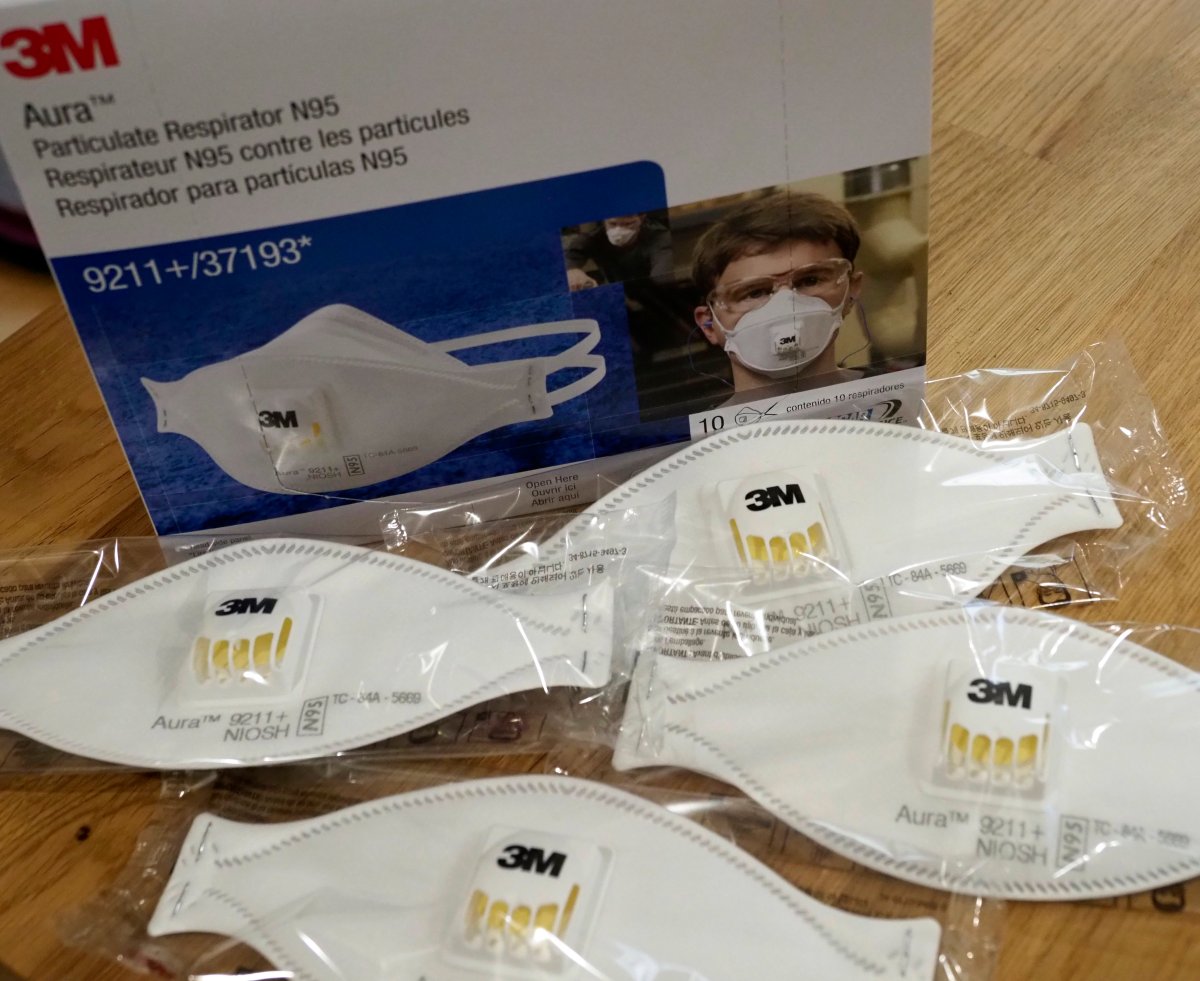Nova Scotia’s chief medical officer of health says the province is considering a call from the province’s nurses to let them decide when they should don N95 respirator masks as they treat COVID-19 patients.

Dr. Robert Strang told reporters Thursday that a request by the nurses’ union concerning the masks would be assessed by the province’s public heath department.
“We’re aware of the position of the unions on masks,” said Strang. “We are putting that information in front of our infection control experts and getting their opinion as to validity of what the health-care unions are asking for.”
READ MORE: Counterfeit Chinese-made face masks pulled offline after Global News probe
Janet Hazelton, president of the Nova Scotia Nurses’ Union, had been seeking an answer on whether a written commitment would be provided.
“We believe nurses are responsible and they’re not going to ask for N95s unless they need them. And if they believe they need them, they should get them,” said Hazelton.
Nurses in Manitoba have also asked for permission to use their clinical judgement to determine access to personal protection equipment, or PPE, pointing out that health workers in Alberta, British Columbia and Ontario have already signed such an agreement with health agencies.

- Shoppers faces proposed class action over claims company is ‘abusive’ to pharmacists
- Most Canadian youth visit dentists, but lack of insurance a barrier
- ‘Bacterial vampirism’: Deadly pathogens attracted to human blood, study finds
- Budget 2024: Liberals look to offset drug plan cost with higher smoking, vaping taxes
Health workers in Alberta have already signed an agreement with health agencies.
The Alberta memorandum notes that if a health-care worker determines “on reasonable grounds” that the N95 respirator is needed, they won’t be “unreasonably denied by their employer.”
READ MORE: Asymptomatic people are reportedly spreading COVID-19. Should everyone wear a mask?
The Alberta memorandum notes that if a health-care worker determines “on reasonable grounds” that the tightly fitted N95 respirator mask is needed, they won’t be “unreasonably denied by their employer.”
Hazelton said it’s currently standard practice to issue N95 masks to nurses in situations where particles of the virus could be projected in aerosol form, such as during intubations and CPR. However, the nurses also want access to the masks at their discretion for other situations where they’re exposed to patients with COVID-19, she said.
Debbie Forward, the president of the Registered Nurses’ Union Newfoundland and Labrador, made a similar request in a conference call with her province’s health officials last week.
On Thursday, Newfoundland and Labrador Health Minister John Haggie referenced productive discussions between nurses’ unions, respiratory therapists and other at-risk health-care workers about collaborating to ensure there is enough protective equipment to go around.
“There are always options there and we are encouraging people to take those choices, but to do so conscious of the fact their use of PPE is done in the context of limited supply and constraint,” he said.
“Until we can guarantee unlimited supplies, we have to make sure that we are really rigid about the appropriateness of the use of the particular mask or the particular gown or the particular set of gloves that is used.”
Haggie said the current concern is around gowns rather than masks, though stocks of essential equipment will fluctuate as the outbreak continues.
In New Brunswick, chief medical officer Dr. Jennifer Russell said the province is in discussions with the unions and WorkSafeNB about proper use of PPE.
“We do not have an indefinite supply, so we just have to be really careful about that judgement and when to use the proper PPE for the right situation, for the right patients,” she said.
In fact, a memo sent out to New Brunswick health-care staff Wednesday warns about excessive use of N95 masks, saying, “liberalizing use of PPE beyond our current guidelines will only serve to provide a false sense of security.”
Prince Edward Island’s chief of nursing, Marion Dowling, said the province is conserving PPE now so it will be available when the Island starts to see more COVID-19 hospitalizations.
– With files from Holly McKenzie-Sutter in St. John’s and Kevin Bissett in Fredericton
This report by The Canadian Press was first published April 2, 2020.
Questions about COVID-19? Here are some things you need to know:
Health officials caution against all international travel. Returning travellers are legally obligated to self-isolate for 14 days, beginning March 26, in case they develop symptoms and to prevent spreading the virus to others. Some provinces and territories have also implemented additional recommendations or enforcement measures to ensure those returning to the area self-isolate.
Symptoms can include fever, cough and difficulty breathing — very similar to a cold or flu. Some people can develop a more severe illness. People most at risk of this include older adults and people with severe chronic medical conditions like heart, lung or kidney disease. If you develop symptoms, contact public health authorities.
To prevent the virus from spreading, experts recommend frequent handwashing and coughing into your sleeve. They also recommend minimizing contact with others, staying home as much as possible and maintaining a distance of two metres from other people if you go out.
For full COVID-19 coverage from Global News, click here.




Comments